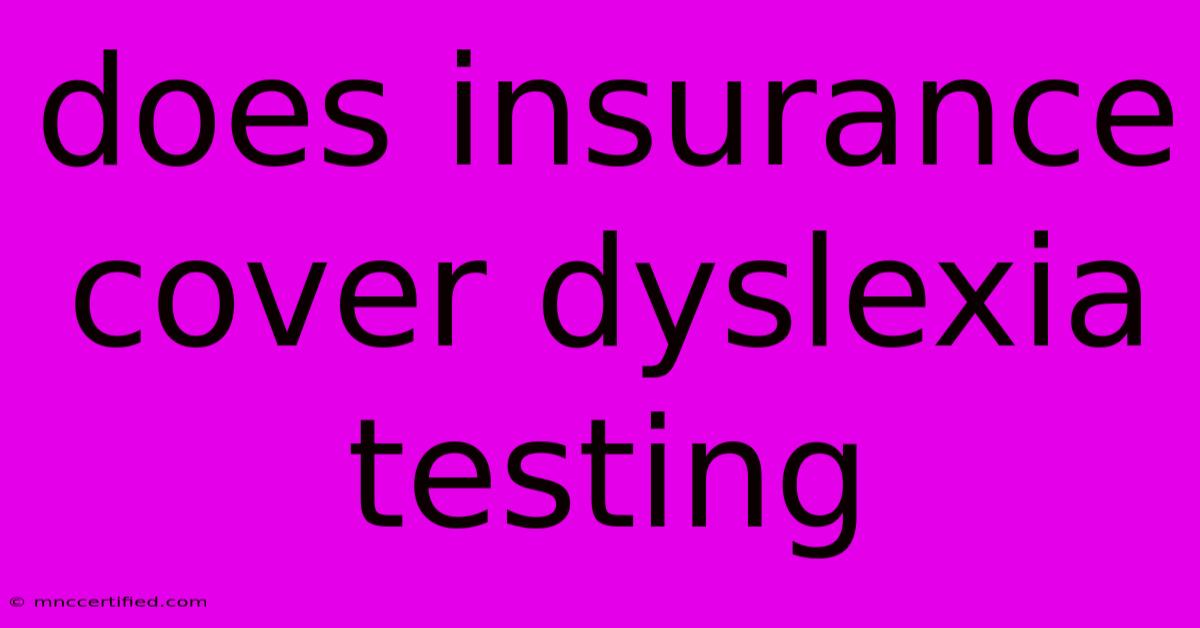Does Insurance Cover Dyslexia Testing

Table of Contents
Does Insurance Cover Dyslexia Testing? A Comprehensive Guide
Dyslexia is a learning disorder that affects reading and spelling. It can make it difficult to learn and succeed in school, and it can also have a significant impact on a person's life outside of school. If you suspect your child or yourself may have dyslexia, getting tested can be a crucial first step towards understanding and addressing the challenges it presents.
But one question often arises: Does insurance cover dyslexia testing? The answer, unfortunately, is not a simple yes or no. Here's what you need to know:
Understanding Insurance Coverage
Insurance coverage for dyslexia testing can vary significantly depending on:
- Your specific insurance plan: Each plan has its own set of covered benefits and exclusions.
- Your state's regulations: Some states have laws that mandate insurance coverage for dyslexia testing.
- The type of testing: Certain testing methods may be covered while others may not.
- Your provider: Some providers may have special policies regarding dyslexia testing.
What You Need to Know
1. Contact Your Insurance Provider: The most important step is to contact your insurance company directly. They can provide you with the most accurate information about what your plan covers.
2. Ask About Specific Coverage: When speaking with your insurer, ask about:
- Specific coverage for dyslexia testing: Don't just assume it's included under "learning disability testing" or similar broad terms.
- Coverage for specific testing methods: Inquire about coverage for different types of assessments, like phonological awareness tests, reading fluency measures, and cognitive evaluations.
- Pre-authorization requirements: Some plans may require pre-authorization before you can proceed with testing.
3. Consider Your State's Laws: Research your state's laws regarding dyslexia testing coverage. Some states mandate that insurance plans cover testing, but the specific requirements can vary.
4. Explore Other Options: If your insurance doesn't cover dyslexia testing, there are other options you can consider:
- Private testing: Many private clinics and specialists offer dyslexia testing services.
- Schools and educational institutions: Some schools offer testing as part of their services, often at reduced rates.
- Non-profit organizations: Look for local organizations that provide support and services to individuals with learning disabilities, including testing.
5. Advocacy Resources: If you face difficulties accessing testing due to insurance coverage, consider reaching out to advocacy groups like the National Center for Learning Disabilities (NCLD) and the International Dyslexia Association (IDA). They can offer valuable support and guidance.
Conclusion
While insurance coverage for dyslexia testing can be confusing, understanding your plan's specific coverage, researching state laws, and exploring alternative options can help you navigate this process effectively. Remember, early identification and intervention are crucial for individuals with dyslexia to reach their full potential. By advocating for your needs and seeking professional guidance, you can gain access to the necessary support and resources.

Thank you for visiting our website wich cover about Does Insurance Cover Dyslexia Testing. We hope the information provided has been useful to you. Feel free to contact us if you have any questions or need further assistance. See you next time and dont miss to bookmark.
Featured Posts
-
Live Stream West Ham United Vs Everton
Nov 10, 2024
-
Tech Defeats No 4 Miami In Upset 28 23
Nov 10, 2024
-
Lsus Dunne Takes Aim At Sabans Comments
Nov 10, 2024
-
Real Madrid Vs Osasuna Live Stream La Liga Match
Nov 10, 2024
-
Ohio State Vs Purdue Live Stream Guide
Nov 10, 2024